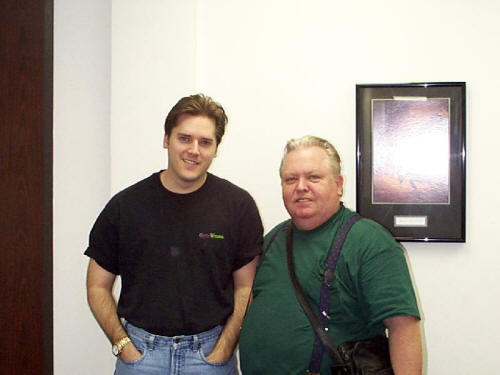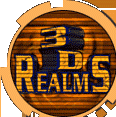The Apogee Legacy #1 - Jim Norwood
Past Pioneers of the Shareware Revolution
Issue #1 - Jim Norwood
Today we lead off a new regular section on our website. Apogee Software has been around since 1987, and while we changed the name we're generally known by (to 3D Realms), the origins of the company are in the name Apogee. We were involved with many developers back in those days. Some of these folks have gone on to bigger things in the game industry. Some are not working in the industry at all anymore. But we've sought out as many of our old developers that we could locate (some of which we haven't had any contact with in a decade) for an interview series based on their time working with us. It's been fun talking to these folks about their time with us, and we hope you enjoy this insight into the developers who helped found what our company is today.
This series will be a regular thing on our website, with a new interview appearing each Monday for you to check out. This first edition of the series is with Jim Norwood. Jim was involved with two projects with us, 1993's Bio Menace, 1997's Shadow Warrior, and assisted on a whole scope of other projects from back in those days such as Duke Nukem, Secret Agent, & Wolfenstein 3D among others. Bio Menace was also recently released as freeware, so we thought that would be a good starting point for our interview series..

1) How did you first come in contact with Apogee?
 I was at the time, like many developers, 'doing my own thing'- just working on a 2D game in my spare time that was something I thought would be fun to play. My day job at the time was some boring dBase programming gig in the business sector working for Raytheon. At least I got to see Patriot Missiles up close and I had cool national security clearance, but those were about the only perks.
I was at the time, like many developers, 'doing my own thing'- just working on a 2D game in my spare time that was something I thought would be fun to play. My day job at the time was some boring dBase programming gig in the business sector working for Raytheon. At least I got to see Patriot Missiles up close and I had cool national security clearance, but those were about the only perks.
At the time, I was making a side-scroller. Those were the popular games back then. I saw the Commander Keen engine from Apogee and was so impressed by how smooth John Carmack had gotten the scrolling in the engine, I naively just picked up the phone and called up Scott Miller at Apogee (yes, CEO's still had direct lines back then. Isn't that something?), and asked him if the source code to the Keen scrolling technology was also shareware. (Duh) Of course it wasn't, but that got Scott and I talking. When Scott also found out I was doing all the art for my own game, he became even more interested and asked me to send him samples of bitmap art I had been doing.
Well, after doing that, they liked my artwork and that landed me my first job in the game industry working on the original Duke Nukem 1 side-scroller doing background art. They even bought me a new PC to do the work on - I felt like a king. I was also given art tasks on various other games as well. In the mean time, I continued with my programming skills on my own, until eventually, we all went down to Shreveport, Louisiana to meet up with John Carmack, and the other ID folks, who by the way, were still working for SoftDisk at that time. They were not really ID just yet, not the way you'd know them now. By the way, just so you know - secretly, my favorite Id game is still Dangerous Dave. I just couldn't get enough of that shotgun. If you loved the shotgun in DooM, you owe a debt of thanks to Dangerous Dave for that!
So in the end, I got that Keen scrolling technology after all when I licensed the technology for my first solo game project, BioMenace, where I'd also be the game's only programmer, as well as the artist, and the designer, the level designer, and the sound engineer...whew! It was great fun, and I will always look back on those days fondly...but honestly, it was also a lot more work than one person should attempt on their own, even in those days.
2) Was there a reason you decided to work with Apogee, say versus going on your own or working with another company?
Apogee was the first company I had contact with and they gave me break into the game industry, which is what I always had wanted. And quite frankly, I didn't know anyone at any other game companies at the time.
3) Looking back, was there anything Apogee could have done better, regarding the marketing and distribution of your game?
Marketing and distribution weren't as big a problem as lack of development resources at the time. I needed a team to get things done before the game became too dated, even if I didn't realize it at the time. I think those early game projects might have been bigger hits if I had had a little help from some friends and put them out a year earlier.
4) Do you think your game was made better or worse by working with Apogee?
As opposed to working with who as an alternative? This is hard to quantify, but I feel that Apogee had a clear vision for what made great games at that time. Their early success proves that fact.
5) Apogee had a policy of letting the designer or studio retain full intellectual property rights to their game. Nowadays, it's rare to find a publisher who allows this, especially if the publisher is providing the funding. Do you believe that it's best for the creator to retain IP rights? Why or why not?
The man footing the bill wins. If a publisher pays for your development costs, he is the one taking all the risks, not you. I believe in that case, the publisher should retain the rights and not the developer. However, in cases where the developer makes the game and then approaches the publisher with a nearly finished product, the developer should clearly hold the rights instead. It's all about who is the one taking the most financial risks on the project. Those are the folks that should reap the most rewards. But you cannot have a hit game without a developer either, so being generous for a job well done is also warranted even if that developer does not retain property rights to his project. I've always felt this was a pretty cut and dry issue, but you'd be surprised at just how muddled development deals can become...

|
| Jim in 2006 |
Hah! Of course I benefited! I got royalty checks for my first games for over ten years! Imagine getting a paycheck for ten year old work you did! Well, I did...on a monthly basis, until the sales finally just fizzled out from old age.
5b) Do you think there'll ever be a sequel to your game(s)?
No. We tossed around the idea a few times, but my projects were never big enough hits, mostly due to late release dates, that they do not have the following to merit a sequel. The comparison here would be to look at sales and popularity of Duke Nukem 3D vs. Shadow Warrior. Shadow Warrior has a following sure, but it's paltry compared to Duke.
6) Is there any story/incident that stands out as interesting during your time associated with Apogee?
A better question would be: are there any stories about my time with Apogee that don't stand out? I had a great time in my seven or so years with Apogee/3DRealms and met and worked with some of the greatest minds in the game industry today. What's not interesting about that? As you know, Id Software was affiliated with Apogee for a good while - so we all knew each other personally.
A very interesting story was the time we had to evacuate from George's house and run for our lives when a certain disgruntled developer who forgot to take his lithium came calling unexpectedly late one night, weapon in hand... I won't go in to details, but that certainly DID get one's blood pumping, and stands as a clear memory to this day. The police arrived to save the day, so we all survived the ordeal in the end.
7) Apogee was an early pioneer in terms of teaming up with external designers and studios, and continues to do so even to this day (currently working with Human Head Studios on Prey). Why is it that so few other studios do this (mentor and fund outside projects with lesser known teams)?
Is it true that other developers do not do this? Microsoft and EA are prime examples of large companies that work with smaller external studios. I work at EA, Redwood Shores now and we have plenty of external development houses helping out on various projects. (I cannot be more specific for legal reasons - sorry.)
8) What is the biggest difference in the industry nowadays versus when you worked with Apogee?
Size. It's bigger, it's more mature. The stakes are higher, the projects monolithic, the competition more fierce than ever... The game industry is for the 'big boys' now. It's moved into a multi-billion dollar industry and the little guys either get assimilated, or destroyed if they resist (sorry for the obvious geeky reference there). Or they just plain run out of funding because they cannot compete with the quality of projects that really large game companies are capable of now.

Jim looking thrilled at having his picture taken.
This was Jim's desk at 3D Realms HQ in 1997.
9) What have you been doing since your time with Apogee?
Making more games of course... I'm currently at EA as a software engineer.
10) If you're no longer making games, have you thought about returning to this industry? If not, why not?
I don't plan on ever NOT making games - when some guys in white coats from the geriatrics ward arrive at my desk to take me away, that's when I'll be done with the game industry.
11) Looking back, are there any missed opportunities that you wish you'd have jumped on?
Id Software offered to hire me on to work on Doom 1 and help me finish BioMenace in the bargain. I declined their generous offer at that time for various reasons. But getting BioMenace done faster would have been a boon, and missing the chance to join Id? Well... need I say more? We don't always make the best choices in life since we might be blinded by other factors at that time. As they say, hind sight is 20/20.
12) Other than your game(s), what's your favorite game released or produced by Apogee (or 3D Realms)?
Duke Nukem 3D. That game kicked ass - period. Dudes - where is Duke 4!? Huh huh?
12a) And what's your favorite 2-4 games released by anyone else?
X-COM 1, Doom 2, No One Lives Forever (series), any game having to do with the WarCraft franchise (I'm currently addicted to World of Warcraft), and ALL BioWare games. (I admit it - I'm a shameless BioWare camp follower).
13) Is there anything else you'd like to add about your time here or to fans of your title(s)?
Sure - figure out how to revamp the Apogee line by creating next-gen side scrollers! It's the 3D revolution, but I'll never stop being a fan of the side-scroller genre. I'm convinced it can still be beautifully done with current generation technology, but most companies, if not all, won't take the marketing risk.
Also, to Frenkel, who created map images of all the BioMenace levels (link) - I thought that was great! My hat is off to you.

Jim with John Galt, the voice of Lo Wang in Shadow Warrior

We'd like to thank Jim for his time in giving such a good interview to launch the series with. If you'd like to continue the trip down memory lane, you can check out the freeware release of Bio Menace, as well as information about Shadow Warrior, both of which are available on our website.
Please remember to tune in next Monday for the next interview in the Apogee Legacy Series.
Posted by Joe Siegler on January 9, 2006 at 10:02 AM | Permalink
| Discuss this story on our forums
News Categories: About 3DR / 3DR Staff | The Apogee Legacy






